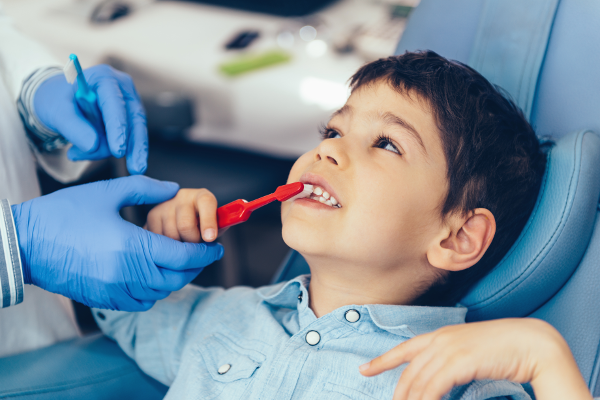Most people think of starting new habits or setting new goals as a “New Years” thing to be done in January. In reality, it’s easier to adopt new habits or make changes to your existing routines when the changes are hidden inside a more significant transition.
August and September are often full of transitions for people. Children go back to school, summer vacations are behind you, and people tend to settle into more predictable rhythms in their daily and weekly lives. This is an excellent opportunity to adopt new habits or change the current ones! At Murfreesboro Family Dentistry, we are excited to help people make small changes in their oral hygiene habits that will lead to happier, healthier smiles!
Evaluate Your Daily Dental Routine
We all know we’re supposed to brush and floss daily, but it’s easy to get lazy or fall out of the habit. September is the perfect time to improve your daily oral hygiene routine!
Brush your teeth the correct way
The American Dental Association recommends everyone brush their teeth at least twice a day, using fluoride toothpaste. Proper brushing technique removes food and plaque that contains bacteria. The bacteria produce acids that attach the enamel on your teeth.
Make sure you brush your teeth for at least 2 minutes, gently moving the brush in circles. And don’t forget your tongue! Plaque can build up on your tongue, causing bad breath, and it may lead to other health problems. Gently give your tongue a quick brushing every time you brush your teeth.
Consider your diet and routine when choosing your regular tooth brushing routine. Acidic food or drinks like coffee or orange juice can weaken tooth enamel. Brushing too soon after eating or drinking acidic foods can actually remove some of the enamel!
Use the right toothpaste
All toothpaste and mouthwash are not created equal, and everyone has different brushing needs! It is essential to choose the right ones for your dental hygiene. One easy improvement to your brushing habits is to make sure you are using the right toothpaste, mouthwash, and other items.
Choose a toothpaste that has at least 1,000 parts per million fluoride and the American Dental Association seal on the box. Some brands use a generic stamp that resembles the ADA seal. Approved brands will have the full ADA seal.
Did you know rinsing with water after brushing your teeth reduces the effectiveness of toothpaste? Rinsing your mouth out washes away the fluoride and doesn’t allow the active ingredients to absorb into your gums and teeth fully. For the best results, you should avoid rinsing, eating, or drinking for 30 minutes after brushing your teeth.
Flossing is actually effective
In 2006 a study with 808 children demonstrated that flossing properly could reduce your risk for cavities by up to 40%. If you don’t floss, you haven’t cleaned about 40% of your teeth’s surfaces.
Flossing once a day removes bits of food and helps prevent plaque buildup between your teeth and fights gum disease. As you floss, move the floss along the curves of your teeth to scrape away the food and plaque. Don’t forget to gently clean beneath the gum line.
Reducing Stress Helps Your Oral Health
Stress is often linked to physical symptoms like headaches, anxiety, and digestive issues. It can also negatively impact your oral health. Two of the most common stress-related oral health problems are jaw issues and teeth grinding.
Stress can cause you to grind your teeth, either during the day when you are concentrating or at night in your sleep. Clenching your teeth or tensing your facial muscles can lead to disorders in the jaw joint or chewing muscles. It can also cause headaches and pain around your ears and face.
Stress can also lead to cold sores and oral infections. Overall, stress weakens your immune system, and your body is less able to kill common germs and bacteria or fight off infections, including gum disease and ulcers.
If you suffer from excess stress in your daily life, take some time to implement stress-relieving patterns in your routine. Exercise and eating healthy are excellent ways to reduce stress. If you are short on time in your day, consider scheduling 10 minutes of yoga and deep breathing exercises every day. Taking up a new hobby like gardening or coloring can also be very stress-relieving.
If you struggle with grinding your teeth at night, talk with your dentist about getting night guards to protect your teeth. The guards create a cushion to prevent damage to your teeth and help reduce the strain on your jaw muscles.
Schedule A Routine Cleaning And Consider Whitening Treatments
Have you been avoiding your routine dental cleanings and checkups? One of the best habits to promote oral health is to have your dentist clean and inspect your teeth every six months. Your dental hygienist checks for cavities, cleans damaging plaque and tartar off your teeth and assesses your gums, tongue, throat, and soft tissue in your mouth.
Visiting the dentist at least twice a year (or as recommended by your dentist) will help you keep your teeth and gums healthy and strong. It can also help address other potential health issues early on. Why not take the opportunity to schedule a checkup and kick the school year or fall season off with a clean, healthy smile.
While you are at your dentist appointment, consider asking about teeth whitening services. Having bright, white teeth can be a significant boost to your self-esteem and confidence. Teeth whitening treatments remove stubborn yellow stains and help brighten your teeth.
Small Dietary Changes Can Make A Big Impact
Making small changes to your diet and eating habits can make a significant impact on your oral and overall health. Your body is complex, and everything is interdependent. The food you eat and how often you eat can impact the health of your teeth and gums.
Dramatic changes to your diet are probably overwhelming and unsustainable, but choosing one or two small changes can make a big difference. Drinking sugary drinks like fruit juice, sugary coffee drinks, or soda increases your risk for cavities. Try to limit when you consume sugary drinks instead of sipping them throughout the day.
Increase your water consumption and limit snacking between meals. When you eat or drink, your mouth releases saliva, which helps you chew and swallow food. Eating a meal is healthier because your mouth releases more saliva, which combats the effects of acids and other things in food that can cause cavities.
Making just a few minor changes to your daily oral hygiene routine can make a significant impact on your overall dental health. Remember, small changes are easy to keep; major shifts in your daily routine might not stick as easily. If you have questions or concerns about your daily oral hygiene routine, contact Murfreesboro Family Dentistry. We are here to help!





